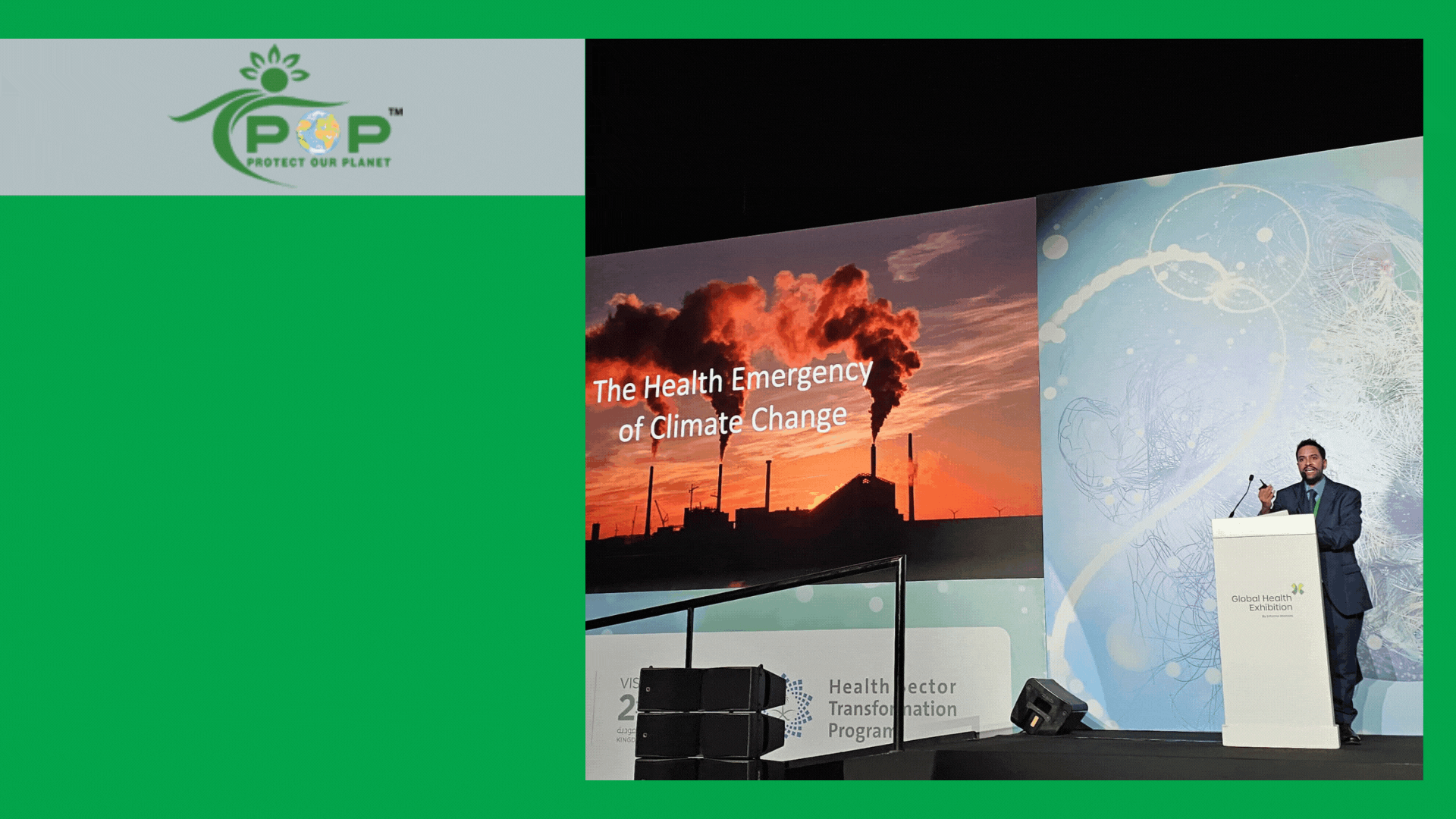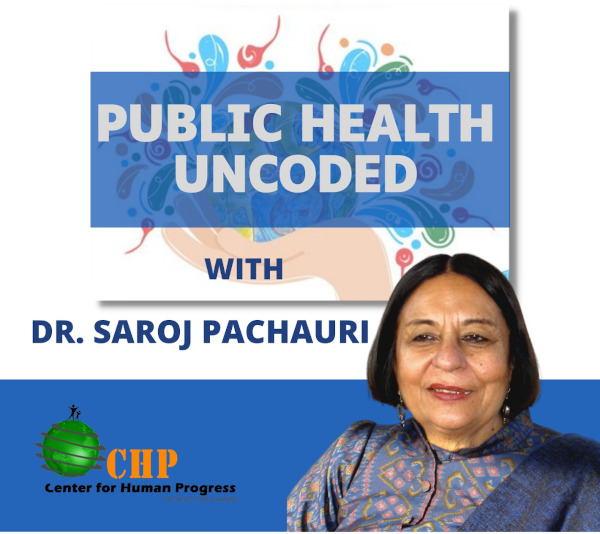Projects
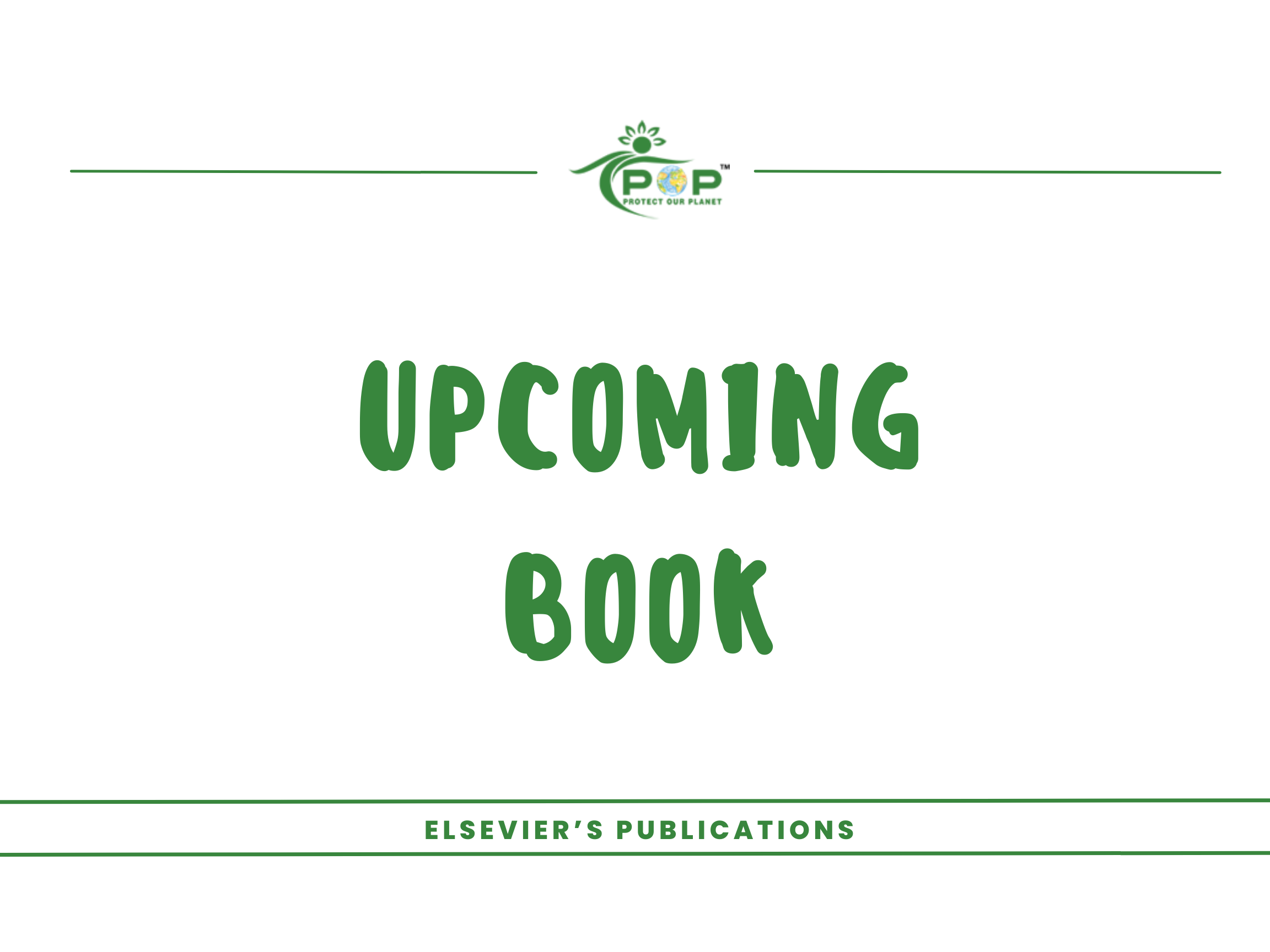
Health and Climate Change: Unraveling the Connections
Editors:
Dr. Saroj Pachauri
Public Health Specialist, Trustee, Center for Human Progress, New Delhi, India, and Director, POP (Protect Our Planet) Movement, New York, USA
Dr. Ash Pachauri
Director, Center for Human Progress, New Delhi, India, and Senior Mentor, POP (Protect Our Planet) Movement, New York, USA
Public Health Uncoded
with Dr. Saroj Pachauri
Dr. Saroj Pachauri, a public health expert, provides commentary on some of the major public health issues of the current times and the various determinants of public health at play with high-risk and vulnerable groups. Every month, Dr. Saroj Pachauri, a doctor of medicine and a distinguished public health scholar with over 60 years of experience, will unpack key public health concerns and opportunities in the current global arena with evidence and insights.
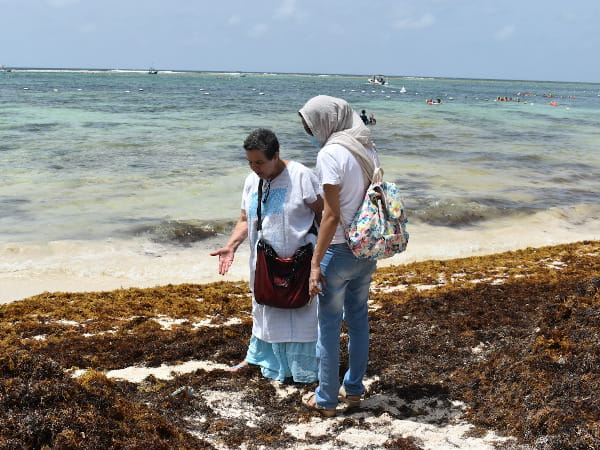
Research Study on Environmental and Health Impact of Sargassum in Quintana Roo, Mexican Caribbean.
In collaboration with IPN (Instituto Politécnico Nacional-México) and The POP Movement
Massive arrival of Sargassum to the coasts of Quintana Roo, Mexican Caribbean, and its impact on Public Health
The massive arrival of sargassum on the coast of Quintana Roo, although it is recurrent, is not constant. There is data on massive arrivals from 2011 and during the period 2012-2018, it can be considered that the arrival of sargassum was considered within normal ranges. As of 2018 and to date, the arrival of large amounts of sargassum has been recorded, the control of which has been challenging and complicated.
Thousand tons of sargassum have been removed from the beaches or collected in the sea and deposited on land in sites designated for it, in the different municipalities of the state of Quintana Roo. Various problems associated with the presence and decomposition of these macroalgae have been observed, such as the bad appearance of the beaches due to their excessive presence, the release of odors (gases such as methane and hydrogen sulfide ) that can be harmful to health, poor quality of the water that takes on a brown color, affectation of coastal ecosystems such as seagrasses and corals, significant loss of biodiversity, etc., and also skin infections due to direct contact with sargassum, affecting not only the inhabitants and tourists who they come to vacation but also and to a greater degree to the workers who continuously carry out activities to remove macroalgae in the sea and on the beaches, until handling them at their final destination on land.
Aim of the research:
To determine if there is a direct relationship between the massive presence of sargassum on the coast of Quintana Roo and public health.
Events
SESSION: IMPACT OF ENVIRONMENTAL FACTORS ON HUMAN HEALTH
DATE: JUNE 7, 2021
The connections between human well-being and the health of the environment are becoming increasingly evident as we acknowledge that the health of the planet is inextricably linked with the health of its inhabitants. This session will discuss how human-influenced changes in environmental factors have lasting consequences on human health. It will also emphasize the need to address the environmental changes by adopting a health perspective and appreciating the complexity of life-supporting systems.
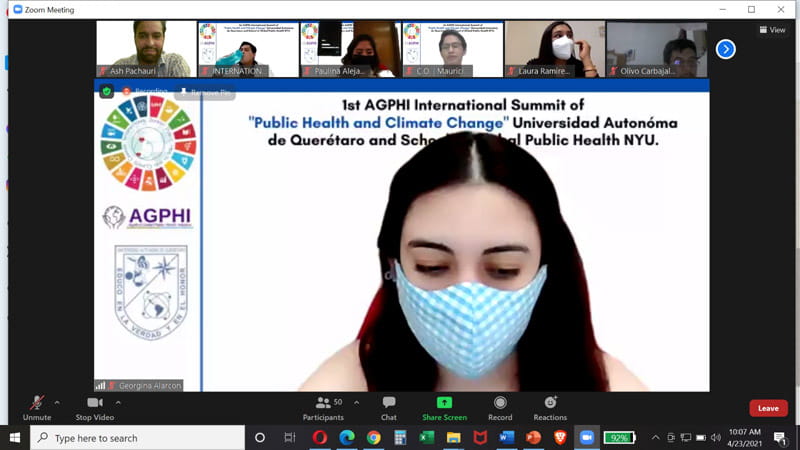
AGPHI International Summit of “Public Health and Climate Change” Universidad Autonoma de Queretaro and School of Global Public Health New York University.
DATE: APRIL 21, 2021, AND APRIL 27, 2022
1st AGPHI International Summit of “Public Health and Climate Change” led by the Universidad Autonoma de Queretaro and the School of Global Public Health NYU was held on April 21st – 23rd, 2021 in commemoration of the International Day of the Earth. At this Summit, climate change issues and their relation to public health were discussed. The Summit focused on many of the Sustainable Development Goals, including SDG 17 of the 2020-2030 agenda for partnerships to achieve the goals, especially the alliance between Mexico and the United States.
On April 27, 2022, POP Senior Mentor Dr. Ash Pachauri presented at the Second International Summit on Public Health and Climate Change organized by the Universidad Autónoma de Querétaro in collaboration with the New York University Applied Global Public Health Initiative Lab. Dr. Ash Pachauri was invited by the NYU School of Global Public Health and the Satellite Lab to address over 75 participants at a session on promoting youth-led actions to address the climate crisis.
Publications
Transforming Unequal Gender Relations in India and Beyond: An Intersectional Perspective on Challenges and Opportunities
Editors: Saroj Pachauri and Ravi K. Verma
About: This book offers a unique intersectional perspective on gender equality, SDG5. It presents an intersection of gender with caste, class, region, ethnic and sexual identities, and other structural drivers of inequalities in various development sectors. It presents case studies and empirical findings from development practice and policymaking and highlights the challenges to implementing SDG5 in practice. It discusses policies to promote gender equality and prevent violence against women and girls, and women in decision-making and leadership positions. The chapters reinstate that gender equality is possible only if unequal gender norms are transformed to recognize women and girls as independent economic entities and not merely homemakers providing unpaid care. It also analyzes to deconstruct the idea of monolithic masculinity to recognize gender diversity and men’s role in providing care. The book shows how much has been achieved, yet how far is also left to go. It is an essential reference point for researchers, policymakers, students, and scholars across gender studies, women’s studies, and sociology.
Women’s Economic Empowerment and SDG-5|Sexual Minorities and SDG-5|Gender|Budgeting|SDG-5 and Violence against Women|Violence Against Women
Maternal Health|Gender Equality|Gender Inequality
Global Perspectives of COVID-19 Pandemic on Health, Education, and Role of Media
Editors: Saroj Pachauri, Ash Pachauri
About: This open access book discusses the impact of the COVID-19 pandemic on various aspects of life on a global scale. It analyzes the challenges in the healthcare system during the second wave of COVID-19, such as overstressed human resources in tertiary facilities, lack of trained healthcare workers, and inadequate infrastructure at secondary-level facilities. The book shows that there has been more disruption in low- and middle-income countries than in high-income countries. It presents how the pandemic drove economies into recession and offers a roadmap to advance equality of access to and sustainability of resources. It studies the impact of prolonged lockdowns, which resulted in emotional and mental unrest. It provides a global perspective on the role of the media, including social media, during the pandemic. The authors discuss the unprecedented rise in suicides and the impact of the pandemic on vulnerable groups, such as asylum seekers and adolescents. In addition, contributing authors cover country experiences with COVID-19 in the UK, Taiwan, Ethiopia, Iran, India, and Brazil. The book's multidisciplinary approach makes it an interesting read for academics, policymakers, program implementers, and researchers in sociology, media studies, and medical experts.
COVID-19|Vaccines Inequity|Mental Health and Suicides|Media and Communications|Sexual and Reproductive Health|Health Services|Pandemic Global Experiences
POP Global Climate Crusade
Drishya Pathak, Komal Mittal, Philo Magdalene A.
About The POP Global Climate Crusade, launched in 2022, aims to fight climate change through joint strategies and self-sustaining initiatives. The POP Africa Festival kickstarted the crusade with youth leaders organizing over 100 climate-related activities that mobilized over 1,000 people through grassroots interventions. The festival provided lessons for future efforts, and youth leaders were considered for prestigious awards like the RK Pachauri and John “Mac” McQuown Awards. The crusade will tour the world, mobilizing, and mentoring youth through collaborations with partners and amplifying identified projects as POP Initiatives. The TerraGreen's Volume 15 Issue 12 on the World Sustainable Development Summit 2023 Special Issue covers the global initiative.
Climate Action|POP Movement|POP Climate Crusade|POP Festival|Health|Climate Change|Youth|Africa|Fest
Communicating Human Security & Capturing Perspectives
Ash Pachauri, Drishya Pathak, Komal Mittal, Norma Patricia Muñoz Sevilla, Philo Magdalene A, Saroj Pachauri
Abstract: The human security index consists of three key components: economic fabric index, environmental fabric index, and social fabric index. These three components include various different indicators like health, education, diversity, peacefulness, governance, food security, environmental vulnerability, protection and sustainability, measures of human, societal, and national progress and GDP, equality in income distribution and financial-economic governance. Although the Human Security Index provides a quantifiable method to rank and categorize countries based on these indicators, it is understood that an individual’s own notion and perception of security varies with changes in human perspectives and experiences. Read more>>>
Human Security|Communication Tools|POP Movement|POP Initiatives|POP Climate Crusade|POP Festival|Health|Climate Change|Youth
Towards a Resilient Planet through Public Health
Drishya Pathak, Komal Mittal, and Philo Magdalene A
Rapid, radical, and systemic changes in every field have been considered the need of the hour to address the code red for humanity: climate change. Such a response requires deliberate consideration with regard to reorganization of resources, funds, and priorities, without trade-offs in the incumbent areas of health, education, and other social measures. In this race against time, a pragmatic approach, especially for governments, would be to incorporate climate change response frameworks and strategies into existing systems and projects, rather than solely piloting new initiatives. Read more>>>
Public Health Framework|POP Movement|Climate Change Framework|POP Climate Crusad|POP Festival|Health|Climate Change|Youth|Self-care|Climate Adaptation|Climate Mitigation|Prevention
Sexual and Reproductive Health and Rights in India: Self-care for Universal Health Coverage
Saroj Pachauri, Ash Pachauri, and Komal Mittal.
About This open access book addresses self-care on sexual and reproductive health and rights and HIV prevention and treatment in the most marginalized and vulnerable communities. Case studies and personal narratives are used to share their perspectives and experiences, sources of information for self-care products, motivations for self-care, and challenges and outcomes. Self-care provides the way to reach the last mile in achieving universal health coverage and the Sustainable Development Goals. Issues related to stigma, discrimination and violence among these communities are highlighted. Changes in policies and programs to improve their sexual and reproductive health, education and employment are discussed. The last chapter in the book examines how the agenda on self-care can be advanced in the years ahead. The audience for this publication includes health professionals, researchers, those managing health institutions and service providers.
Self-care|Sexual and Reproductive Health|Universal Health Coverage|HIV Prevention|Health|Climate Change|Vulnerable Communities
COVID-19: a wake-up call to protect planetary health
Ash Pachauri, Norma Patricia Muñoz Sevilla, Shailly Kedia, Drishya Pathak, Komal Mittal,and Philo Magdalene A
Abstract Set from the perspective of planetary health, the objective of this chapter is to examine the trends set in motion by Coronavirus disease 2019 (COVID-19), attempting to discuss the long-term environmental and humanitarian implications. The emergence of zoonotic diseases has underscored that risk-based interventions need to be designed from the perspective of planetary health. The pandemic response must account for its implications on humans and the planet. To address this subject, the chapter discusses emerging infectious diseases in the context of declining planetary health and the COVID-19 pandemic. The chapter underscores the inadequacy of the transient improvement in some environmental quality parameters and short-term decrease in global greenhouse gas emissions. The inevitable global waste crisis arising from increasing use of plastic and other nonbiodegradable materials in the context of COVID-19 is discussed. Inequalities and vulnerabilities, in light of emerging humanitarian concerns, on account of the COVID-19 pandemic are examined. The need for a long-term vision and recommendations that could potentially address the key concerns flagged in the chapter are then discussed. This chapter argues that planetary health approaches that are needed to address the multiscale issues related to environmental quality and human well-being by protecting our planet. Read more>>>
COVID-19|Humanitarian|Planetary Health|Plastic|Pollution|Waste Management
Environmental Justice and Equity: An Exploration through the POP Movement
Ash Pachauri, Drishya Pathak, Komal Mittal, Meghana Elsa Thomas, Nahid Pérez Ayala, Norma Patricia Muñoz Sevilla, Philo Magdalene A, Vanessa Anahí Hernández Vázquez
Abstract Environmental Justice, defined as “The fair treatment and meaningful involvement of all people regardless of race, color, national origin, or income with respect to the development, implementation, and enforcement of environmental laws, regulations, and policies” (EPA), has been the object of study of this article in which it is shown how through the work of Non-Governmental Organizations (NGOs), the problem of inequalities and problems that arise in the day for certain communities and spaces can be revealed. The background shown and the methodology used are the result of numerous activities developed by “The POP Movement” (2016), in collaboration with various organizations, academic institutions, governments, civil society and particularly with young people from various countries around the world, among others: The International Conference and POP Festival for Youth-Led Climate Action; Intergenerational Dialogue on Environmental Justice and Equity; Latin American Dialogue; GlobalMindED Webinar and Truth and Reconciliation Week. The results obtained from the direct participation of the actors are shown through the problem analysis format, which are recorded within the framework of equity, justice, human rights and the environment, during the events. These results have allowed the design of strategies of action to address the identified problem, under the principle of “Youth inspired by Knowledge.” These results are manifested in various areas: Differentiated impact of climate change; Role of government in environmental justice, and Role of communities and other sectors. Finally, the conclusions obtained during the development of the various events mentioned are presented and that lead us to the following consideration, “The threat of the climate crisis is the one that looms over the world. And yet, the impact of climate change disproportionately affects some of the lives and livelihoods of the world’s most vulnerable and marginalized communities.” Read more>>>
Equity|Environmental Justice|POP Movement|POP Festival|Health|Climate Change|Youth|Climate Action
Safe and sustainable waste management of self care products
Ash Pachauri, Director, Prerna Shah, Honorary researcher and environmentalist, Bethanie C Almroth, senior lecture, Norma P M Sevilla, Professor, Manjulaa Narasimhan, Scientist
The global growth rate of self care medical devices is estimated to rise from $10.5bn (£8bn, €9.2bn) in 2013 to $16.8bn in 2019—a compound annual growth rate of 7.0%.1 This increase directly correlates with the level of disposables entering the waste stream. Additionally, over half of the world’s population is now at risk from occupational, environmental, or public health threats due to improper management of healthcare waste.2 Waste management of products used for self care is largely unregulated and evidence is limited.
The World Health Organization defines self care as the “ability of individuals, families, and communities to promote health, prevent disease, maintain health, and cope with illness and disability with or without the support of a healthcare provider.”3 Self care products include a variety of sexual and reproductive health commodities such as condoms, tampons, sanitary pads, and self administered injectables. An analysis of these commodities shows the magnitude of waste management challenges facing individuals, communities, and governments worldwide. Read more>>>
Self-care|Waste Maangement|Sustainability|Self-care Prodcuts|Sexual and Reprodcutive Health Products|Technology
Safe and sustainable waste management of self-care products
Ash Pachauri, Director, Prerna Shah, Honorary researcher and environmentalist, Bethanie C Almroth, senior lecture3, Norma P M Sevilla, Professor, Manjulaa Narasimhan, Scientist
Health Dimensions of COVID-19 in India and Beyond
Editors: Saroj Pachauri, Ash Pachauri
Environmental Justice and Equity: An Exploration through the POP Movement
By Ash Pachauri, Drishya Pathak, Komal Mittal, Meghana Elsa Thomas, Nahid Pérez Ayala, Norma Patricia Muñoz Sevilla, Philo Magdalene A, Vanessa Anahí Hernández Vázquez
COVID-19: a wake-up call to protect planetary health
Ash Pachauri, Norma Patricia Muñoz Sevilla, Shailly Kedia, Drishya Pathak, Komal Mittal,and Philo Magdalene A
Communicating Human Security & Capturing Perspectives
ASH PACHAURI, DRISHYA PATHAK, KOMAL MITTAL, NORMA PATRICIA MUÑOZ SEVILLA, PHILO MAGDALENE A, SAROJ PACHAURI
Towards a Resilient Planet
Drishya Pathak, Komal Mittal, and Philo Magdalene A





